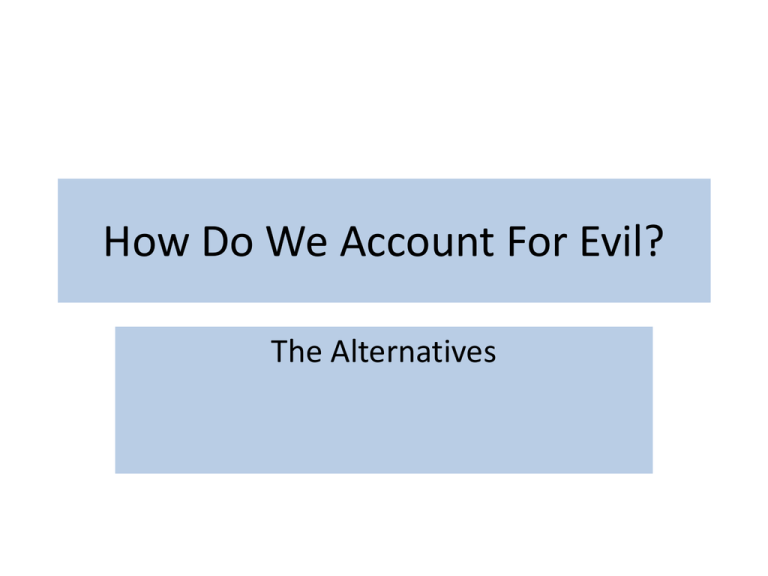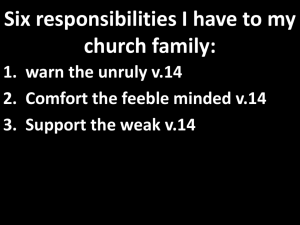student origins of evil
advertisement

How Do We Account For Evil? The Alternatives Review • • • • • Evil exists, but God does not Which worldview? God exists, but evil does not Which worldview? Evil exists, an all-good and all powerful God exitsts. • Which worldview? Responses to J. S. Mill • Deny that God is all-powerful • This is known as finitism • God is good, but unable to _______________. Since God has not defeated evil, He must be incapable of doing so. • What does finitism attempt to do? • Why must a Christian reject this view? • There is no hope that things will ever become better. • If God is powerful enough to ________________________, why would He create one He cannot control? Dualism • God and evil are co-eternal, all-powerful opposites. This explains the mixture of ___________________ in our world. • What is attractive about this view? • It rescues God’s ____________and love • What attribute of God is lost here? • There is again no hope of a solution Dualism • Logically, what is wrong with this view? • The irresistible force against the immovable object. • This view of dualism is contrary to the ________________ of God and of evil (Satan) • Can God create a rock so big that He can’t lift it? The Biblical Alternative • God is both all powerful and all loving • There are two objections to this view. What are they? • Why did such a God ________ evil (Causation)? • Why hasn’t God put an ______________ (Cessation)? The origin of evil • It doesn’t come ____________________ Job 34:10, Psalm 99:9, Isaiah 6:3, Hab. 1:13, James 1:13, Rev. 15:4 • The first theodicy: ___________________________. (Romans 8: 28) • Problems? • The text doesn’t say all things are really __________. • It merely says God will bring _______out of evil to those who love him. But the _________ is still evil. • The Best Possible World Defense • God is morally bound to create the best of all possible worlds. Since there is evil in the world, God must have seen that this was the best of all possible worlds. This world is the best possible world that God could have produced. • Certain evils are necessary to achieve certain good ends. • E. G. There must be suffering if there is to be compassion Various Theodicies • Another way of saying this is that evil is necessary to ultimately ________________________. • But wouldn’t this be true for God as well? God would have to experience evil for Him to appreciate the good. • And, if it isn’t necessary but just conducive to the appreciation of good, then we just go back to the theodicy of “evil is just good”. • This theodicy also tends to eliminate _____________________ for sin. Various Theodicies • The Free Will Defense • People and the angels were created with ________________, free choice • What would have been the alternative? • Robots. It is not possible to have free will and _______________________. If there is real choice, there has to be the possibility of choosing evil. • Without choice, the highest value in the universe– ____________– is not possible. Free Will Defense • What are the issues with this defense? • It is true that Adam had the ability/freedom to choose good or evil. All people are free __________ agents, with the ability to make choices. • And, Scripture does teach that man is to __________ for sin • We are not victims of historical determinism- that is, we can’t use heredity, environment, selfesteem as excuses for violating God’s commands. Free Will Defense • However, does Scripture teach free will in the sense that this theodicy teaches free will? • In Romans 9 _______ could have used this defense. He could have said that Israel rejected God due to human choice. But he doesn’t say that, even though we believe in human responsibility. • Rather, Paul traces the matter back to ____________________. • Scripture elsewhere never uses the free will defense. See Psalm 37 or 73. Free Will Defense • Can this view co-exist with God’s ____________? • Eph. 1:11, Dan. 2:21, Mt. 10:29, Lk. 22:22 • Can this view co-exist with God’s _____________? • Omniscience renders the future as certain. Why? • If God foreknows all things, they will come to pass. Otherwise, they could not be foreknown. • The cynic objects: then doesn’t this make God ….. _________________ Indirect cause defense • Theologians distinguish between _________ and _____________ causes or ultimate and proximate causes. • For example, if I hit billiard ball A, and it hits ball B, and B hits C, I am the ultimate cause of C’s movement. However, ball B is the proximate cause of C’s movement. • In this view, God is the _____________ cause, but not the ____________ cause of evil, and therefore he does not bear the blame for evil. • It is true God’s role is indirect– it was Satan who tempted Adam and Eve Indirect cause defense • Does this take away God’s ______________? • It doesn’t on the human level. Why? • If I hire a hit man and someone is murdered, I am just as responsible as the one who pulled the trigger. • Scripture also warns that enticing one to sin is sin itself. (Deut. 13:6 ff. and Romans 14) • Also, is this view compatible with the ______________of God? The Ad Hominem Defense • When an unbeliever questions God’s goodness or love, the apologist replies that the unbeliever can’t even raise the issue since they can’t explain ________________. • It is only in light of the good that we say something is evil. Unrighteous implies what is meant by righteous; Inhuman implies that we know what is human. • Christians can account for the ___________ but an unbeliever can’t account for either. • However, the argument addresses the person and not the issue itself. The Greater Good Defense • In Scripture, ________ is treated simply as something we must deal with. We wish we had more answers but often we do not. • _________ never defends himself and always claims his sovereign right to be trusted and believed. He reserves the right to act in a way that sometimes _________ our idea of right and wrong. The Greater Good Defense • See Job, especially beginning at chapter 38. • Notice that Job never receives an answer as to why he had to endure evil and suffering. • The lesson for us is that we should be careful not to accuse God when we probe the matter of evil. • See Jesus’ parable in Matthew 20: 1-16. • See Romans 9: 14. Paul asks if God is unjust. The Greater Good Defense • The bottom line– God has the right to do what He wishes. He is under no obligation to give us answers that intellectually satisfy our minds. He expects us to merely trust Him. • It isn’t a blind faith, an irrational faith yet it differs from “sight”. The nature of faith is to persevere despite unanswered questions. The Greater Good Defense • God uses _______ for his own good purposes. His ultimate purpose is not to provide for our happiness but to bring glory to himself. • Consider: what would have happened had Adam obeyed? • There would have been no need for Jesus. And, we would not know God nearly as well. The Greater Good Defense • We can learn from Scripture some of the ways God is using evil to bring about ultimate good. • Evil displays his grace and his justice. • Shock value to draw unbelievers • Fatherly Discipline (Hebrews 12) • Our suffering, done for the right reasons, is also redemptive. Look at Paul. • In Scripture, we see evil used again and again for good. The Greater Good Defense • This theodicy doesn’t have a theoretical answer to the problem of evil. Instead, it urges us to _______ God even in the midst of unexplainable suffering. • Could not an omnipotent, omniscient God have found a better alternative, given the pain that evil causes? Natural Evils • How do we explain natural evils? • Natural evil is the result of ______________. See Romans 8: 18-22 Final Thoughts on Suffering • If we look at the cross we still don’t know why God allows evil to continue. • But, we do know what the answer is not. • It can’t be that He doesn’t _____________. • He takes our evil or suffering so seriously that He was willing to ______________________. • God ____________ with us in our pain. The Issue of Cessation • “Why Hasn’t God stopped evil” is the issue • If God stopped all evil at midnight tonight, ______________________ at 12:01? • God would have to take away our __________________ • Just because God has not yet stopped evil doesn’t mean ______________. Cessation • God has already taken steps to ensure evil does not run uncontrolled. What are some? • Government- see Romans 13: 1-7 • The church- it shines a bright light into the world of darkness • The Bible gives us the prescription for right living • The family- instituted by God to bring stability to society. Cessation • God defeated evil officially and will end it actually. The last chapter of the Bible indicates God will triumph. • Peter tells us why God is so patient. 2 Peter 3:9



